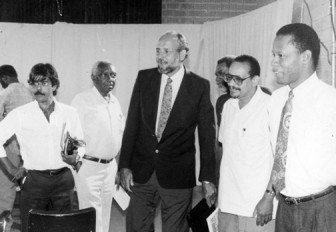The local media fraternity yesterday suffered a severe blow with the sudden death of veteran journalist Sharief Khan, 59.
Khan, the former Editor-in-Chief of the Guyana Chronicle and a former Assistant Editor of Stabroek News, was remembered by many as a committed media practitioner, who gained considerable renown locally as well as regionally and internationally, having served as the stringer for several foreign news organizations.
Khan died early yesterday morning at his Goedverwagting home, where he reportedly fell and hit his head in his bathroom. He had been ailing for some time and his poor health forced him to retire as Editor-in-Chief of the state-owned Chronicle.
Khan’s brother, speaking with Stabroek News briefly via telephone early yesterday morning, confirmed his passing and said that the loss had come as a great shock to family, colleagues and friends. Khan, he said, “had not been in the very best health for a while.”
In a message of condolence last evening, President Bharrat Jagdeo said Khan was “a good, decent human being” and “had a kind heart, was congenial, respectful and wholeheartedly committed to his work.” He described him as an outstanding journalist and noted that he was passionate about his vocation as a media practitioner. “He was the most senior journalist in the country and someone who exemplified hard work and commitment to his job,” he said.
Prior to his death, Khan served as a consultant to the Climate Change Unit at the Office of the President. According to President Jagdeo, he brought to the job the same dedication, passion and skill which had characterized his years in the media. “He was a valued member of the Climate Change team and we will certainly miss him,” he said. “On behalf of the Government of Guyana, particularly the Climate Change Unit, and on my own behalf, I extend sincerest condolences to his grieving family, other relatives and friends.”
Good family friend
An emotional Moses Nagamootoo, journalist, former Information Minister and a current PPP/C MP, said he had heard the news of Khan’s passing on the radio and when he spoke to this newspaper he was still digesting what he described as the “shocking news.”

Khan was a very good family friend, said, Nagamootoo who noted that his children referred to him as “uncle.” He recalled that he had only recently spoken to Khan’s doctor, who had indicated how well Khan had “recovered from an earlier episode.” He said he thought with the stress of his Editor-in-Chief job behind him, Khan would have lived a “more measured life” and as such he did not expect him to pass away like this. He described Khan as a very conscientious journalist, who always had to do the right thing all the time. “He was very dedicated and committed to the profession and always strived to work in the ethics of journalism,” Nagamootoo said.
Further, he described Khan’s death as untimely and a great loss to the media profession in Guyana.
Khan had lived with him during some difficult periods in his life and as such became very close to his family, he said. “I have not even broken the news to my wife and children as yet,” Nagamootoo said while adding that Khan was a “comrade in the struggle and stood for a good cause.”
Journalist Bert Wilkinson, who is also the Associated Press correspondent, recalled that he worked with Khan at the Stabroek News for some years but even before that time the two knew each other well. He said Khan was a very good journalist but his only weakness was that he “wore his emotions on his sleeve.”
Gigabits of institutional memory Wilkinson said his former colleague had an “accomplished career” as his work was not only known and appreciated in Guyana but also regionally and internationally. He said he had seen Khan a few months ago. He had asked him if he was visiting his doctor and Khan promised that he would have done so shortly. “So I was shocked when I got the news,” he said. “The country has lost a senior practitioner and one with gigabits of institutional memory,” Wilkinson said, while noting that Khan was knowledgeable in areas ranging from sports to politics to religion to Caribbean affairs.
Referring to the recent death of another veteran journalist, Clem David, Wilkinson said that many of the senior journalists have since gone to the great beyond while others have migrated, leaving the young journalists to fend for themselves.
Sports Editor of the Chronicle, Leon Horatio said Khan was one of the leading journalists in Guyana and a very hard worker “who knew his stuff.” He said, “He was a very disciplined journalist and the nation has lost.”
Horatio added that he was “still shocked” at the news as while he knew Khan was ailing for a while, he did not expect him to die. “The media fraternity has lost a stalwart,” he added.
Meanwhile, a statement from the Guyana Press Association (GPA) yesterday said that it was “shocked and deeply saddened” at Khan’s passing. The statement said Khan was always a passionate advocate for free speech and expression, particularly during the time he served and lived as a journalist in Guyana prior to the 1992 elections. “In his new dispensation, he continued to pursue his journalistic endeavours with the same vigour and commitment when he became Editor-in-Chief of the Guyana Chronicle,” the GPA said.
Unwavering
It added that Khan always supported its programme and was unwavering in his loyalty to the fraternity. It noted that he assisted the younger journalists and guided them, even during press conferences, “when his ‘sotto voice murmuring’ would indicate to them that they were either following the right or tripping over the wrong angle.”
Khan, the association said, was an active member of the media for more than three decades, ever since the days when he walked into the officers of the late Carl Blackman at the Daily Chronicle and asked to be a correspondent from West Demerara. The release said that Blackman, who was the General Manager and Editor-in-Chief of the newspaper at the time, later said: “That boy had an eye for news.”
The GPA said Khan was a stringer/correspondent for the BBC, CANA, Radio Antilles and Reuters for several years and he travelled extensively to cover the news when and where it happened. The association also said as a reporter, Khan preferred to cover the politics of the country and incurred the wrath of many but cared little.
A statement from the National Communications Network (NCN) said the entity was saddened at the passing of Khan, who it said was known for “his fearless and fair approach to journalism, especially during the difficult period in the eighties and early nineties.” It said, “He walked the walk and talked the talk.”
Further, NCN said Khan’s contributions to the development and maintenance of high standards and professionalism was noted and it described him as a personal friend to many at the company.
Stabroek News Editor-in-Chief Anand Persaud expressed condolences on the passing of Khan. He said Khan had played an important role as the Chief Reporter in the formative years of the newspaper. Persaud added that Khan was an integral figure in the newspaper’s coverage of the campaign for the return to democracy, culminating in the historic 1992 general elections.
Persaud said that Khan had personally guided him and other trainee reporters on the fundamentals of journalism during his tenure at Stabroek News. He said his passing is a severe loss to the profession.
The Caribbean News Agency (CANA) in a statement last night said it noted Khan’s passing with “profound regret”.
Acting General Manager Ainsley Sahai said “He was a reservoir of knowledge and was ever willing to share that knowledge. He had a passion for news. He was a thinker who held fast to his views but was never inflexible.
“He respected the views of others although he may not have necessarily agreed with those views. He dealt with issues rather than with personalities.”
Khan, who originally hailed from Vergenoegen, began his journalistic career as a freelancer and subsequently joined the newsroom at Radio Demerara, according to Anna Benjamin’s Birth of Stabroek News.
He remained there until 1978, when he was offered a position at the Chronicle as a senior reporter by Blackman. While there he covered the Jonestown tragedy and the following year he wrote a full account of Father Bernard Darke’s murder, only to find that it had been replaced with a seven-line statement from the Government Information Service. Khan left the newspaper after it was clear to him that whatever the governing party wanted in the newspaper would go. He later became a CANA correspondent and worked with it until 1981, when he moved to the United States Information Service as an information assistant. At Stabroek News he was appointed as Chief Reporter in 1987 and eventually rose to the position of Assistant Editor, before returning to the Chronicle.




